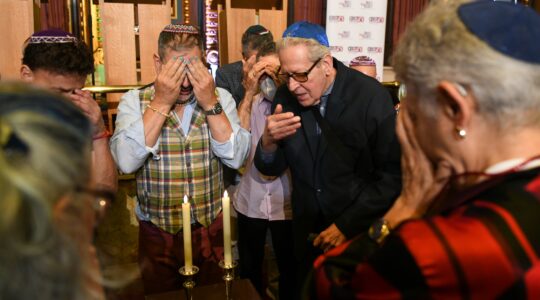Has a Russian-language newspaper in America known for its assertive stand for a Russian-American Jewish community independent of influence back home fallen under the sway of Moscow?Some in the Russian-speaking world are asking this question six weeks after the Russian Forward, the well-regarded weekly newspaper, was sold to local businessmen and Jewish organizational leaders known collectively as the Mitzvah Media Group.While the founders of Mitzvah Media — Dr. Igor Branovan, Dr. Dmitri Shiglik and Leonard Petlakh, associate executive director of the Hebrew Free Loan Society — are best known for starting Russian American Jews for Israel, a pro-Israel lobbying group, others who were brought into the deal are involved in a more controversial body called the World Congress of Russian Jewry.The WCRJ contingent includes businessman Edward Renko and community activist Leonid Bard, both of Chicago, and Mikhail Nemirovsky, a Brooklyn activist.
Founded in Moscow two years ago to be a worldwide umbrella body for Russian-speaking Jewry, the WCRJ is funded primarily by the Federation of Jewish Communities of Russia (FIOR) and is headed by Lubavitch-linked Rabbi Berel Lazar, who was installed as chief rabbi of Russia by the government of President Vladimir Putin.Nemirovsky, chairman of the WCRJ-North American chapter as well as director of Russian Jewish community affairs at the Jewish Community Relations Council of New York, was appointed the editor-in-chief of the Russian Forward.Critics of the sale fear the newspaper, which once strongly criticized FIOR and WCRJ, will now become an apologist for both organizations, and perhaps for Putin, at a time when some believe the Russian leader is moving to squelch democracy in his country.“The old Forward was the only independent media voice in the Russian community,” said Inna Stavitsky, director of the Older Refugee Project for the Jewish Association for Services for the Aged. “I expect the new Forward will probably have stronger ties to Russia, something that is very dangerous given that Russia is now turning to autocracy.”
Vitaly Raevsky, a New Jersey resident, helped to organize a letter from a group of disgruntled Russian Forward readers from around the country that ran in another Russian-language newspaper.The letter contends that “RAJI and its permanent president, Mr. Branovan, are just the facade behind which is hidden [the hand of] Moscow and shameful WCRJ.”
Critics also characterize the sale as part of a recent trend toward greater “Russification” of the Russian-Jewish media in North America.They point to the main Russian-language television station in the United States, RTVI-1, and the only Russian-language daily newspaper in North America, the nearly 100-year-old Novoye Ruskoye Slovo in New York.
RTVI-1 is controlled by the Israel-based former oligarch Vladimir Gusinsky and includes much news and cultural programming transmitted directly from Moscow. Novoye Ruskoye Slovo was purchased last year by Kiev oligarch Vadim Rabinovitch, who during the recent Ukrainian presidential election openly favored the now-discredited candidate Viktor Yanukovych, a close ally of Putin.Yet neither Raevsky nor another vociferous critic of the sale, Vladimir Yedidovich, editor of the Russian Forward from 1995 to 1999, offered convincing evidence to back up their claims that the WCRJ was a creation of the Putin regime.Pressed for proof, Yedidovich responded, “The mission of the WCRJ, to unite all Russian-speaking Jews worldwide under one umbrella, directly benefits the Kremlin, which seeks to lure Jewish emigres back to Russia.”
Still, the charges by Raevsky and Yedidovich received a boost last week when Yelena Bonner, the widow of the late human rights dissident Andrei Sakharov, criticized the sale of the Russian Forward during a Dec. 14 speech in Manhattan.
“I am upset about the Forward in the context of Novoye Russkoye Slovo and the tragic changes at Radio Liberty [which is being downsized by Congress and moved from Prague to Moscow],” Bonner said, though she did not “accuse” the publications’ owners. “I am suspicious that all of this is the dealings of the FSB [the successor agency of the KGB].”
Members of Mitzvah Media dismiss the idea that they bought the Russian Forward to present a pro-Putin line. They note that their principle innovation thus far is a deal with the Israeli Russian-language newspaper Vesti to supply pages of political and cultural events in Israel to be published weekly.
“I don’t give a damn about the WCRJ or who is the chief rabbi of Russia,” Petlakh said. “Branovan, Shiglik and I care about strengthening the connection of Russian-Jewish emigres with the American Jewish community, not the Russian one. We also care about strengthening our community’s ties with Israel.”
Branovan said, “My colleagues and I bought the Forward as individuals, not as members of organizations. There is no affiliation between the newspaper and RAJI, WCRJ or any other organization. The idea was to create a paper that would be the voice of the Russian Jewish community.”The Russian Forward started in 1995 when Yedidovich, a Jewish emigre from Lithuania, convinced Sam Norich, chairman of the Forward Association, to launch a Russian-language newspaper to complement the Forward Association’s Yiddish and English-language papers and appeal to the large community of Russian Jewish emigres here.
Despite its editorial quality — the paper was widely considered to be among the best of the scores of Russian-language publications — the Russian Forward was losing as much as $1 million a year, and Norich decided he would have to close the paper if he could not find a buyer.Since taking over the newspaper just over a month ago, the new owners have cut costs by moving its offices from Manhattan to Brooklyn, cutting staff and reducing printing costs. The Russian Forward claims a circulation of 11,000 to 12,000, with about half the readers in the New York area.Nemirovsky, who as a member of many American and Russian Jewish organizations refers to himself as “a community man,” sees no conflict between that role and being an objective editor-in-chief.
“I am ready to include material critical of any or all Jewish organizations in the newspaper, but the criticism should be balanced,” he said. “A community newspaper should include different perspectives, but should also strive to unite the Jewish community.”The focus on unity was featured in his coverage of a Dec. 7 appearance by Vladimir Slutzker, recently appointed president of the Moscow-based Russian Jewish Congress, at a meeting of the Board of Governors of the NCSJ, a venerable Washington-based advocacy group on behalf of ex-Soviet Jews.
Slutzker, a wealthy businessman who is a member of the upper house of the Russian parliament, raised some eyebrows when he said he was unaware of violations of democracy by Putin’s government.Putin has ruled that Russian governors would no longer be popularly elected but would be appointed by the Kremlin, and the government has taken over several formerly independent media outlets.
Although many in the audience expressed concern over Slutzker’s speech and another Russian-language newspaper referred to Slutzker as “A Jewish Representative of the Kremlin,” Nemirovsky wrote in his editor’s column in the Russian Forward that Slutzker “made a good impression on the attendees” at the NCSJ event.Nemirovsky also cited a promise by Slutzker to “develop partnership relations with all the Jewish organizations of Russia,” an obvious olive branch to Rabbi Lazar.
“Vladimir Slutzker is now a leader of Russian Jewry and wants to create peace in the [Russian] Jewish community,” Nemirovsky said. “Leaders of Russian-American Jewry like me need to deal with him.”
Asked whether he wasn’t creating a perception problem by remaining in a prominent position in the Moscow-based WCRJ while simultaneously running the Russian Forward, Nemirovsky replied, “I feel it is better to be inside the organization, where I can have an impact, than to be outside looking in. Yet if anyone can show me any occasion where I intentionally served the interests of Putin or Russia, I am ready to resign myeditorship.”
Nemirovsky also noted that the WCRJ American section is moving toward financial and organization autonomy from the parent body in Moscow.
The New York Jewish Week brings you the stories behind the headlines, keeping you connected to Jewish life in New York. Help sustain the reporting you trust by donating today.




